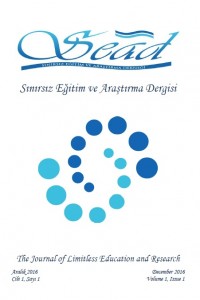Abstract
Today's technological developments affect not only our everyday life,
but also the educational environment. The improved tools give the mobility to the learners
thanks to their features like smallness, wireless internet access. The learners
gained the opportunity to learn wherever they want, whenever they want and as
much as they want desired information. In this respect, mobile technologies
seem to provide limitless learning environments for individuals. It is enough for the individual to be willing and
curious, because mobile technologies have created very different environments
for learners. In this study, it is
evaluated that limitless learning is supported by mobile learning. It is
explained that contributions of mobile learners to limitless learning
are classified as Physical, Cognitive and Social Support.
References
- Ally, M. (2009). Mobile Learning: Transforming the Delivery of Education and Training (Ed. Mohammed Ally). Canada: Marguis Book Printing.
- Andreasen, N. C. (2011). Yaratıcı Beyin Dehanın Nörobilimi. (4. Bs). (Çev. Kıvanç Güney). Ankara: Arkadaş Yayınevi.
- BBC (2012). Encyclopedia Britannica Yalnızca Dijital Olacak. <http://www.bbc.co.uk/turkce/haberler/2012/03/120314_encyclopedia.shtml>. (Son Erişim: 08.11.2016).
- Crompton, H. (2013). A Historical Owerview of M-Learning: Toward Learner-Centered Education. In Handbook of Mobile Learning (Eds. Zane L. Berge and Lin Y. Muilenburg), 3-14. USA and UK: Taylor & Francis.
- Floro, N. (2011). Infoline Tips, Tools, and Intelligence for Trainers. USA: American Society for Training & Development.
- Güçlü, A. (2013). Eğitimde Birinci Öncelik Öğretmen Mi, Teknoloji Mi?. http://www.milliyet.com.tr/egitimde-birinci-oncelik-ogretmen/gundem/ydetay/1786233/default.htm adresinden 09.11.2016 tarihinde erişilmiştir.
- Güneş, F. (2007). Türkçe Öğretimi ve Zihinsel Yapılandırma. Ankara: Nobel Yayınları
- Güneş, F. (2010). Öğrencilerde Ekran Okuma ve Ekranik Düşünme. Mustafa Kemal Üniversitesi Sosyal Bilimler Enstitüsü Dergisi, 7 (14), 1-20.
- Güneş, F. (2012a). Eğitimde Zihinsel Bağımsızlık. Bartın Üniversitesi Eğitim Fakültesi Dergisi, 1 (1), 3-21.
- Güneş, F. (2012b). Okuma ve Zihni Yönetme. Mustafa Kemal Üniversitesi Sosyal Bilimler Enstitüsü Dergisi, 9 (18), 1-15.
Abstract
Günümüz teknolojik gelişmeleri günlük
hayatımızı etkilediği gibi aynı zamanda eğitim ortamlarını da etkilemiştir.
Geliştirilmiş olan araçlar özellikle küçük olmaları, kablosuz internet
erişimine sahip olma gibi özellikleri sayesinde öğrenen kişiye hareketlilik
sağlamıştır. Öğrenen istediği yerde, istediği zaman, istediği bilgileri
istediği kadar öğrenme imkânına kavuşmuştur. Bu açıdan mobil teknolojilerin
bireyler için sınırsız öğrenme ortamları sağladığı görülmektedir. Bunun için
bireyin istekli olması ve merak etmesi yeterlidir çünkü mobil teknolojiler ile
öğrenenler için çok farklı ortamlar oluşturulmuştur. Bu çalışmada sınırsız öğrenmenin mobil
öğrenme ile desteklenmesi değerlendirilmiştir. Mobil öğrenmenin sınırsız
eğitime yaptığı katkılar Fiziksel, Bilişsel ve Sosyal Destek olarak
sınıflandırılarak açıklanmıştır.
Keywords
References
- Ally, M. (2009). Mobile Learning: Transforming the Delivery of Education and Training (Ed. Mohammed Ally). Canada: Marguis Book Printing.
- Andreasen, N. C. (2011). Yaratıcı Beyin Dehanın Nörobilimi. (4. Bs). (Çev. Kıvanç Güney). Ankara: Arkadaş Yayınevi.
- BBC (2012). Encyclopedia Britannica Yalnızca Dijital Olacak. <http://www.bbc.co.uk/turkce/haberler/2012/03/120314_encyclopedia.shtml>. (Son Erişim: 08.11.2016).
- Crompton, H. (2013). A Historical Owerview of M-Learning: Toward Learner-Centered Education. In Handbook of Mobile Learning (Eds. Zane L. Berge and Lin Y. Muilenburg), 3-14. USA and UK: Taylor & Francis.
- Floro, N. (2011). Infoline Tips, Tools, and Intelligence for Trainers. USA: American Society for Training & Development.
- Güçlü, A. (2013). Eğitimde Birinci Öncelik Öğretmen Mi, Teknoloji Mi?. http://www.milliyet.com.tr/egitimde-birinci-oncelik-ogretmen/gundem/ydetay/1786233/default.htm adresinden 09.11.2016 tarihinde erişilmiştir.
- Güneş, F. (2007). Türkçe Öğretimi ve Zihinsel Yapılandırma. Ankara: Nobel Yayınları
- Güneş, F. (2010). Öğrencilerde Ekran Okuma ve Ekranik Düşünme. Mustafa Kemal Üniversitesi Sosyal Bilimler Enstitüsü Dergisi, 7 (14), 1-20.
- Güneş, F. (2012a). Eğitimde Zihinsel Bağımsızlık. Bartın Üniversitesi Eğitim Fakültesi Dergisi, 1 (1), 3-21.
- Güneş, F. (2012b). Okuma ve Zihni Yönetme. Mustafa Kemal Üniversitesi Sosyal Bilimler Enstitüsü Dergisi, 9 (18), 1-15.
Details
| Journal Section | Makaleler |
|---|---|
| Authors | |
| Publication Date | December 28, 2016 |
| Submission Date | January 11, 2017 |
| Acceptance Date | December 7, 2016 |
| Published in Issue | Year 2016 Volume: 1 Issue: 1 |


